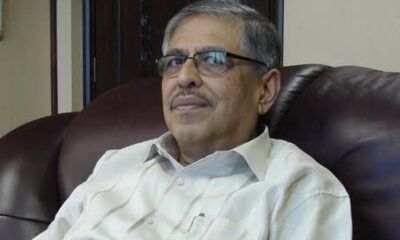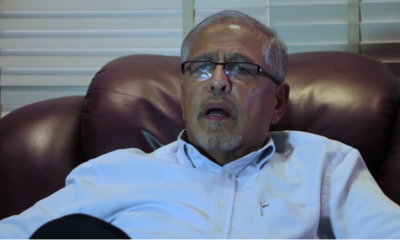Investigations
Tanzanian Billionaire Defies Court Orders, Presses On With Kilifi Gas Plant Amid Safety Fears
Lake Gas and fellow Tanzanian tycoon Rostam Aziz’s Taifa Gas represent new entrants challenging the near-monopoly of Mohamed Jaffer’s African Gas and Oil Limited (AGOL), which currently handles approximately 90 percent of Kenya’s imported LPG.

In a bold move that has raised serious concerns about regulatory compliance and public safety, Tanzanian billionaire Ally Edha Awadh’s Lake Gas is pushing ahead with its controversial bulk cooking gas terminal in Kilifi County, despite a clear court ruling halting construction and revoking the company’s environmental license.
The 25,000-metric tonne liquefied petroleum gas (LPG) storage facility, situated along Kenya’s coast, represents a significant business expansion for Awadh’s Lake Group.
However, the project now stands at the center of a growing controversy that pits economic interests against environmental safety and community rights.
“Tanks with a storage capacity of 10,000 tonnes are ready for use,” a company insider confirmed to Kenya Insights, adding that Lake Gas is preparing to commence operations “within the month” – a statement that directly contradicts the March 10th ruling by the National Environment Tribunal.
Court Orders Flouted
The tribunal explicitly revoked Lake Oil’s Environmental Impact Assessment (EIA) permit, which had been issued by the National Environment Management Authority (NEMA) in December 2019.
The ruling cited “want of adequate public participation” with the local community – a critical requirement for projects with potential environmental and safety implications.
“It is hereby ordered and decreed, that the EIA licence No. NEMA/EIA/PSL/8728 issued by the first respondent to the second respondent on December 10, 2019, is hereby cancelled/revoked,” stated the tribunal in its unambiguous ruling.
More troublingly, this wasn’t the first time Lake Oil has shown disregard for legal directives.
The tribunal also ordered directors of both Lake Oil and Vipingo Development Limited – the landowners – to pay a Sh2 million fine for defying an earlier January order to freeze construction pending final decisions.
Community Concerns
Local residents who petitioned against the project expressed serious concerns about both the environmental impact and safety risks associated with a major LPG facility in their community.
“The company conducted superficial consultations that didn’t address our concerns about potential gas leaks, explosions, or other accidents,” said Amina Juma, a community representative who wrote to Kenya Insights.
“A facility of this magnitude requires thorough risk assessment and community input, neither of which happened adequately.”
Environmental experts note that properly conducted EIAs are essential for identifying and mitigating negative environmental and social impacts of industrial projects, particularly those handling volatile substances like LPG.
The standoff comes amid significant changes in Kenya’s cooking gas market.
Lake Gas and fellow Tanzanian tycoon Rostam Aziz‘s Taifa Gas represent new entrants challenging the near-monopoly of Mohamed Jaffer’s African Gas and Oil Limited (AGOL), which currently handles approximately 90 percent of Kenya’s imported LPG.
Industry analysts suggest that additional competition could potentially lower handling fees and, consequently, retail prices for cooking gas – a welcome development for Kenyan consumers facing high energy costs.
However, these economic benefits must be balanced against safety and environmental considerations, particularly when investors appear willing to circumvent regulatory processes.
Regulatory Response Awaited
All eyes are now on the Energy and Petroleum Regulatory Authority (EPRA), which initially approved the project following NEMA’s now-revoked permit. There are credible fears that rogue EPRA officials could be compromised by huge cash to look aside as it has been in many cases before.
Industry observers are watching closely to see if EPRA will enforce the tribunal’s decision by issuing orders to halt the project immediately.
“This case represents a critical test of Kenya’s regulatory framework,” noted environmental law expert Dr. James Mwangi. “When wealthy investors openly defy court orders, it undermines the rule of law and sets a dangerous precedent for future projects.”
Kenya Pipeline Company is also planning to build a 30,000-tonne government-owned facility in Changamwe, which would further reshape market dynamics if completed.
For now, Lake Gas appears determined to forge ahead with its operations despite the legal cloud hanging over the project – raising serious questions about regulatory enforcement and corporate accountability in Kenya’s energy sector.
As this story continues to develop, Kenya Insights will provide updates on regulatory responses and potential implications for both the cooking gas market and environmental governance in Kenya.
Kenya Insights allows guest blogging, if you want to be published on Kenya’s most authoritative and accurate blog, have an expose, news TIPS, story angles, human interest stories, drop us an email on [email protected] or via Telegram
-

 Business1 week ago
Business1 week agobetPawa Empire Crumbles: Mr Eazi’s Betting Gambit Unravels Amid Partner’s Shadowy Deals
-

 News7 days ago
News7 days agoDCI Probes Meridian Equator Hospital After Botched Procedure That Killed a Lawyer
-

 Business6 days ago
Business6 days agoMinnesota Fraud, Rice Saga, Medical Equipment Deal: Why BBS Mall Owner Abdiweli Hassan is Becoming The Face of Controversial Somali Businessman in Nairobi
-

 Business2 weeks ago
Business2 weeks agoKRA Boss Humphrey Watanga In Big Trouble In Sh5.5 Billion Rice Import Scandal
-

 Politics6 days ago
Politics6 days agoYour Excellency! How Ida’s New Job Title From Ruto’s Envoy Job Is Likely to Impact Luo Politics Post Raila
-

 News6 days ago
News6 days agoKenya Stares At Health Catastrophe As US Abandons WHO, Threatens Billions In Disease Fighting Programmes
-

 Business1 week ago
Business1 week agoState Set to Demolish Pastor Ng’ang’a’s Church in Sh28 Billion Railway City Push
-

 Investigations1 week ago
Investigations1 week agoEXPOSED: SHA Officials Approve Higher Payments for Family, Friends as Poor Patients Pay Out of Pocket


























